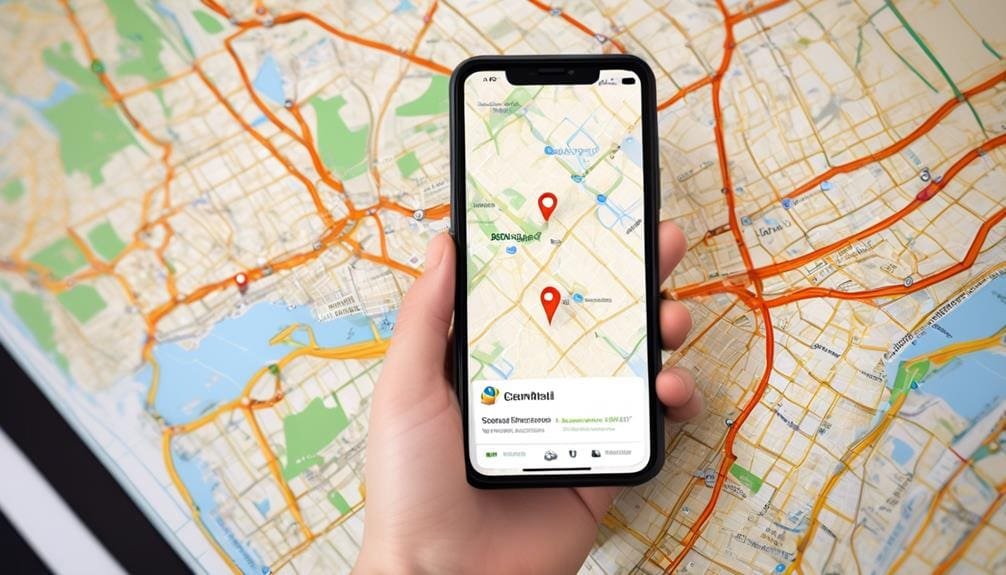12 Strategies for Geo-Targeted Meta Description Optimization
January 19, 2024 | by Jacob Cavazos

Have you ever wondered how to tailor your meta descriptions to target specific geographic locations effectively? Well, look no further. In today’s competitive digital landscape, geo-targeted meta-description optimization is crucial to any successful SEO strategy. From incorporating relevant keywords to leveraging local schema markup, 12 key strategies can significantly enhance the effectiveness of your geo-targeting efforts. Whether a small local business or a multinational corporation, these optimization tactics can substantially attract relevant local traffic and improve your overall search engine visibility.
Incorporate Relevant Keywords
Incorporating relevant keywords in meta descriptions significantly enhances search engine visibility, especially for specific geographic locations, improving local search rankings and increasing user engagement. By integrating local keywords into meta descriptions, businesses can effectively target their content to particular regions, optimizing their SEO efforts for local search. This strategic use of geo-specific keywords improves the chances of appearing in location-based search results and attracts targeted traffic to the business’s website. When users are presented with meta descriptions that contain keywords tailored to their location, they are more likely to find the content personalized and relevant, thus increasing the likelihood of click-throughs and user engagement. Additionally, geo-targeted meta descriptions with relevant keywords can enhance the overall user experience by delivering content specific to the user’s location. As a result, businesses can expect improved local search rankings, increased website traffic from their target geographic areas, and, ultimately, greater visibility and relevance in local search results.
Write Compelling Calls to Action
By leveraging compelling calls to action in meta descriptions, businesses can prompt targeted user engagement, driving them to take specific actions aligned with their geographic location and preferences. Craft calls to action that urge users to take the desired action, such as ‘Sign up now for exclusive local offers!’ Incorporate persuasive language and a sense of urgency to encourage engagement, for example, ‘Limited time: Visit our store for a special geo-targeted discount!’ Utilize location-specific phrases to create a sense of local relevance and urgency in the call to action. Tailor calls to action to align with the specific needs and interests of the targeted geographic audience, such as ‘Find the nearest store and shop today!’ It’s essential to experiment with different calls to action and analyze their performance to optimize for maximum user response. By continually refining and testing calls to action, businesses can effectively drive user engagement and prompt valuable actions from their geo-targeted audience. This strategic approach to writing compelling calls to action within meta-descriptions is crucial to geo-targeted meta-description optimization strategies.
Highlight Local Offers and Promotions

Highlighting local offers and promotions is crucial to attracting nearby customers and driving foot traffic to your business. When optimizing geo-targeted meta descriptions, it’s essential to emphasize the following to evoke an emotional response in the audience:
- Exclusive Deals: Tailor offers and promotions to the specific geographic location of your target audience, making them feel valued and special.
- Limited-Time Promotions: Showcase time-sensitive deals and local events to create a sense of urgency and excitement, motivating local customer engagement.
- Customized Incentives: Utilize geo-targeting to display personalized offers in meta descriptions, catering to local customers’ interests and needs and fostering a sense of community and belonging.
- Hyperlocal Relevance: Highlighting local offers and promotions in meta descriptions helps establish your local business as an integral part of the community, fostering a sense of pride and support among nearby residents.
Emphasize Local Business Information
We’ve found that including local phone numbers and addresses in meta descriptions can significantly emphasize a business’s local presence. By applying schema markup for local business details, we can enhance the local relevance of our meta descriptions. Additionally, utilizing geo-targeted keywords can further boost visibility in local searches.
Business Address Visibility
To emphasize a local business’s presence and attract nearby customers, it is essential to ensure that the business address and contact details are prominently visible on the website. This enhances visibility in specific locations and supports local SEO efforts. Incorporating location-specific keywords in meta descriptions and utilizing schema markup for precise local business information further boosts visibility on local search engines. Highlighting local promotions, events, or offers in meta descriptions can attract nearby customers and improve engagement. Additionally, emphasizing the proximity of the business to the searcher’s location in meta descriptions is crucial for targeted engagement. These strategies enhance the Google My Business listing and increase the likelihood of appearing in ads based on location, thereby maximizing the business’s exposure to local searches and directories.
Local Phone Number Display
Emphasizing the local phone number prominently within meta descriptions and website content is crucial for signaling the business’s local relevance and accessibility. Local companies can effectively target customers in specific geographical areas and improve online visibility by incorporating area codes and regional phone prefixes. Including the local phone number in meta descriptions attracts local customers, enhances click-through rates, and strengthens local search engine optimization efforts. For mobile users, highlighting the local phone number in meta descriptions is essential for geo-targeted meta description optimization, as it enhances local SEO. This strategy also helps to establish credibility and trust with local audiences, making it an integral aspect of local backlinks. Below is a table highlighting the importance of local phone number display in meta descriptions and website content:
| Benefits of Local Phone Number Display |
|---|
| Attracts local customers |
| Improves click-through rates |
| Strengthens local SEO efforts |
| Establishes credibility and trust |
Utilize Location-Specific Language

When optimizing meta descriptions, incorporating local lingo and regional keywords can significantly enhance the relevance and appeal of the content to specific geographic areas. Utilizing language that resonates with the targeted location’s audience helps establish a connection and build trust, ultimately improving click-through rates. Tailoring meta descriptions to reflect the culture and meet the needs of the targeted location can further amplify the impact of location-specific language.
Local Lingo
Incorporating location-specific language and colloquial expressions into meta-descriptions can significantly enhance local relevance and effectively resonate with the targeted audience. When using local vocabulary, it’s crucial to understand the specific geographic locations and their cultural nuances. Using relevant keywords and tailoring the content to include regional dialects and expressions, meta descriptions can establish a strong connection with the local audience. This helps capture their attention and foster a sense of community. Integrating slang, idioms, or regional phrases that resonate with the targeted audience is essential, creating a personalized connection and understanding. Reflecting popular local expressions, terms, or references in meta descriptions not only aligns with the cultural preferences of the audience but also enhances the overall optimization for geo-targeted content.
Regional Keywords
Utilizing location-specific language and keywords in meta descriptions is crucial for targeting specific geographic audiences and improving local search engine rankings. By incorporating regional keywords, businesses can better connect with local customers and enhance their visibility in particular regions. Tailoring meta descriptions with language and terms that resonate with the targeted geographic location is essential for effective geo-targeted optimization. This approach attracts relevant local traffic and increases the chances of customer engagement and conversion. Implementing geo-targeted meta descriptions with location-specific phrases and terms is vital for optimizing for specific regions and improving overall search rankings. Below is a table outlining the impact of regional keywords on local online visibility and user engagement:
| Keywords | Impact on Local Online Visibility | Impact on User Engagement |
|---|---|---|
| Regional keywords | High | High |
This data underscores the importance of regional keywords in geo-targeted meta-description optimization.
Focus on User Intent and Local Needs
To effectively optimize meta descriptions, it is essential to understand the local users’ intent and tailor the content to address their needs. When focusing on user intent and local needs in geo-targeted meta-description optimization, we must consider the following:
- Understanding Local Pain Points: By empathizing with the specific concerns and challenges of the local audience, we can craft meta descriptions that directly address their needs, fostering a stronger connection.
- Incorporating Local Offers and Events: Highlighting local promotions, events, and exclusive offers in meta descriptions can capture users’ attention, providing valuable and relevant information.
- Providing Localized Solutions: Tailoring meta descriptions to provide localized solutions or benefits that are uniquely valuable to users in the targeted location can significantly enhance the online presence and relevance of the content.
- Reflecting Relevance Through Keywords: Incorporating local keywords and phrases in meta descriptions accurately reflects the content’s relevance to the local audience, improving visibility on search engines.
Showcase Local Testimonials and Reviews

When addressing user intent and local needs in meta-description optimization, showcasing local testimonials and reviews becomes a powerful tool for establishing credibility and fostering trust within the specific geographic area. Highlighting customer satisfaction through local testimonials and reviews enhances the customer experience and increases visibility and engagement with the target users. By incorporating satisfied customers’ feedback in meta descriptions, businesses can effectively appeal to local searchers and strengthen the impact of geo-targeted SEO efforts.
Utilizing geo-targeting to display relevant testimonials and reviews based on the user’s location allows businesses to demonstrate their positive impact within the local community. This approach helps build trust and positions the company as a reliable and reputable choice for local consumers. Positive local testimonials serve as social proof, influencing potential customers’ purchasing decisions and reinforcing the brand’s credibility within the specific geographic area.
Convey Proximity to Searchers
We’ll explore the crucial role of location-based messaging in meta descriptions, leveraging specific keywords and phrases to convey proximity to searchers. By emphasizing a localized value proposition, we can effectively communicate the relevance of our business to the searcher’s current location, appealing to local audiences. Crafting proximity-focused messaging with persuasive language will demonstrate how our offerings meet the unique needs of searchers in specific geographic areas, driving engagement and conversions.
Location-Based Messaging
By strategically incorporating location-specific information in meta descriptions, businesses can effectively convey their proximity to searchers and enhance their visibility in local search results.
- Utilize geo-targeted messaging to highlight proximity.
- Incorporate location-based keywords for relevance
- Mention nearby landmarks or popular locations
- Craft meta descriptions emphasizing specific location needs
Geo-targeted meta-description optimization is crucial for businesses aiming to enhance their local reach. By tailoring meta descriptions with location-based messaging, companies can effectively communicate their proximity to potential customers, increasing the likelihood of appearing in local search results. Utilizing geo-targeted keywords and referencing nearby landmarks signals relevance to searchers, improving the chances of engagement. Crafting meta descriptions that emphasize serving the specific needs of searchers in a particular location can further enhance the business’s targeted marketing efforts. This strategic approach to meta-description optimization strengthens a business’s local visibility and fosters connections with nearby customers.
Localized Value Proposition
Emphasizing our business’s physical location in the meta description allows us to convey proximity to searchers while tailoring our messaging to resonate with the local community. By highlighting local benefits, mentioning nearby landmarks, and using language that resonates with the local community, we connect with searchers and demonstrate our understanding of their needs. This targeted approach enhances our geo-targeted SEO efforts and attracts nearby searchers, ultimately driving more relevant traffic to our website. Leveraging a localized value proposition in our meta descriptions improves our visibility in local search and increases the likelihood of attracting visitors based on their specific location. The table below outlines the key components of conveying a localized value proposition in meta descriptions.
| Key Components | Description | Example |
|---|---|---|
| Highlight Local Benefits | Showcase specific offers for local topics | “Exclusive deals for New York residents” |
| Mention Nearby Landmarks | Enhance local relevance by referencing local landmarks | “Conveniently located near Central Park.” |
| Use Local Language | Tailor messaging to resonate with the local community | “Join the thriving Miami community.” |
| Demonstrate Understanding | Show understanding of local needs and preferences | “Serving the unique tastes of Chicago” |
Proximity-Focused Messaging
Incorporating location-specific details and references in meta descriptions effectively conveys the business’s proximity to searchers, enhancing the relevance and appeal of the messaging. To give proximity-focused messaging, companies can emphasize the convenience of their location, such as being ‘just minutes away from [landmark]’ or ‘serving the [specific area] community.’ Highlighting the business’s relevance to the searcher’s location, for example, by stating ‘offering services tailored for [specific area]’ or ‘serving the needs of [specific area] residents,’ can also strengthen the connection. Using phrases like ‘your local [business type]’ can evoke a sense of familiarity and belonging, resonating with the targeted audience. Such geo-targeted meta-description optimization is vital in local search and digital marketing, as it helps businesses stand out in search engines and build trust through proximity and relevant customer reviews.
Tailor Meta Descriptions for Mobile Users
Crafting meta descriptions tailored explicitly for mobile users requires a focus on brevity and impactful content to capture their attention effectively. With the increasing dominance of mobile search, optimizing meta descriptions for mobile users is crucial for a successful geo-targeting SEO strategy. When tailoring meta descriptions for mobile users, it’s essential to consider the limited screen space and the shorter attention spans associated with mobile browsing. Including relevant content specific to the location is imperative, as mobile users often search for immediate solutions or services nearby. By incorporating localized keywords, businesses can ensure their meta descriptions resonate with mobile users seeking local offerings.
Furthermore, a clear and compelling call-to-action within the meta description can prompt mobile users to take the desired action, whether visiting the physical location or engaging with the content. Prioritizing the most persuasive information at the beginning of the meta description is also vital, as it increases the chances of capturing mobile users’ attention before they scroll past the snippet.
Optimize for Local Search Behavior

Businesses can strategically use geo-targeting to reach potential customers based on location to enhance local search visibility. Optimizing local search behavior is crucial for increasing the likelihood of appearing in search engine results for specific geographic areas. Here are some effective strategies for optimizing meta descriptions and content for local search behavior:
- Incorporate Local Keywords: Including local keywords in meta descriptions and titles can improve local search rankings and enhance users’ visibility in a specific area.
- Prioritize Mobile Optimization: Mobile users often seek nearby businesses, so prioritizing the target’s proximity to searchers’ current locations is essential for mobile optimization.
- Create Effective Geo Pages: Including relevant information such as addresses, contact details, and promotions on geo-specific pages can increase the likelihood of attracting local customers.
- Utilize Targeted Advertising: Leveraging resources like Google AdWords’ location targeting feature and social media platforms for targeted ad placement can maximize the effectiveness of geo-targeting efforts.
Leverage Local Schema Markup
To maximize local search visibility and provide search engines with specific details about your business’s location and offerings, leveraging Local Schema Markup is essential for enhancing the effectiveness of geo-targeting efforts and improving search engine results. Local Schema Markup, such as Local Business Schema, is crucial in helping search engines understand your business’s NAP (Name, Address, Phone Number) information. By implementing Local Business Schema, companies can enhance search engine results with rich snippets tailored for local queries, ultimately improving visibility in local search results and map pack listings. This markup also includes relevant information, such as local events, reviews, and ratings, further strengthening a business’s local search presence. Incorporating Schema Marnly benefits search engines like Google in understanding and presenting information to the target audience. It also helps companies provide accurate and comprehensive details, making it an indispensable tool for geotargeted-description optimization. Leveraging Local Schema Markup is a strategic approach that aligns to deliver tailored and relevant information to local search users, ultimately enhancing the overall effectiveness of geo-targeting efforts.
Monitor and Analyze Local Performance

Monitoring and analyzing local performance is crucial for optimizing geo-targeted strategies and adapting to evolving local search trends. Utilize tools like Google Analytics to monitor and understand the effectiveness of your local SEO strategies. Regularly monitor local SEO performance using tools like Google Analytics to adapt to changing local search trends. Track local rankings, analyze data, identify areas for improvement, refine optimization strategies, and adjust geo-targeting strategies based on tracking data. Use a global geo proxy network to browse the web from different international locations and verify whether geo-targeting works. Inspect issues like performance and latency that may affect conversion.
Analyzing local performance is essential for effective geo-targeting. Monitoring and adapting to local search trends can improve our strategies and enhance our visibility in specific regions. Utilizing tools like Google Analytics allows us to gather data and make informed decisions based on real-time insights. Tracking local rankings and refining optimization strategies based on this data increases our visibility and ultimately improves conversion rates. It’s crucial to use a global geo proxy network to accurately verify the effectiveness of our geo-targeting efforts in different locations. By analyzing performance and latency, we can address any issues impacting our conversion rates and overall success in local markets.
Frequently Asked Questions
What Is Geo Targeting SEO Strategy?
Geo-targeting SEO strategy involves optimizing for local SEO, creating location-based content, using regional keywords, implementing geofencing marketing, developing city-specific landing pages, targeting by geolocation, focusing on neighborhoods, and optimizing for zip codes.
What Is Geo Targeting Techniques?
We utilize location-based targeting to tailor content, employing geographical keywords and regional customization for local optimization. By integrating geo-specific content, we enhance local search and refine regional SEO, thus elevating our location-based advertising effectiveness.
Which of the Following Are Ways to Use Geo-targeting to Increase Conversions?
Using geo-targeting to increase conversions involves incorporating local keywords, regional language, location-based offers, customized landing pages, micro-targeting ads, geofencing campaigns, local customer testimonials, and city-specific content. These strategies effectively drive local engagement and conversions.
What Is a PPC Geo Targeting?
PPC geo-targeting is location-based advertising, allowing us to reach a targeted audience through regional and localized messaging. It involves geographic segmentation and local SEO optimization for creating location-specific content.
RELATED POSTS
View all



